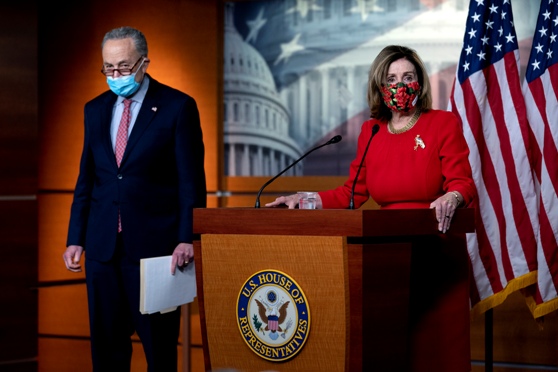Congress strikes long-sought stimulus deal to provide $900 billion in aid

By Emily Cochrane
WASHINGTON — Congressional leaders on Sunday (20) reached a hard-fought agreement on a $900 billion stimulus package that would send immediate aid to Americans and businesses to help them cope with the economic devastation of the pandemic and fund the distribution of vaccines.
The deal would deliver the first significant infusion of federal dollars into the economy since April, as negotiators broke through months of partisan gridlock that had scuttled earlier talks, leaving millions of Americans and businesses without federal help as the pandemic raged. While the plan is roughly half the size of the $2.2 trillion stimulus law enacted in March, it is one of the largest relief packages in modern history.
“We can finally report what our nation has needed to hear for a very long time,” Sen. Mitch McConnell, R-Ky., the majority leader, said Sunday night. “More help is on the way.”
It was expected to be merged with a sweeping catchall spending measure that would keep the government funded for the remainder of the fiscal year, creating a $2.3 trillion behemoth whose passage will be Congress’ last substantive legislative achievement before adjourning for the year. The deal came together after a weekend of frenzied negotiating only hours before the government was set to run out of funding and two weeks before the next Congress was to convene on Jan. 3.
Still, even as it prepared to pass a consequential measure, Congress was at the peak of its dysfunction, having left so little time to complete it that lawmakers faced a series of contortions to get it across the finish line. With additional time needed to transform their agreement into legislative text, both chambers had to approve a one-day stopgap spending bill — their third such temporary extension the past 10 days — to avoid a government shutdown while they were finalizing the deal.
Both chambers approved the measure on Sunday night, and President Donald Trump signed it shortly before midnight. Final votes on the spending package were expected as early as Monday (21) to approve it and clear it for Trump’s signature, but had yet to be scheduled.
Although text was not immediately available, the agreement was expected to provide $600 stimulus payments to millions of American adults earning up to $75,000. It would revive lapsed supplemental federal unemployment benefits at $300 a week for 11 weeks — setting both at half the amount provided by the original stimulus law.
It would also continue and expand benefits for gig workers and freelancers, and it would extend federal payments for people whose regular benefits have expired.
The measure would also provide more than $284 billion for businesses and revive the Paycheck Protection Program, a popular federal loan program for small businesses that lapsed over the summer. It would expand eligibility under the program for nonprofits, local newspapers and radio and TV broadcasters and allocate $15 billion for performance venues, independent movie theatres and other cultural institutions devastated by the restrictions imposed to stop the spread of the coronavirus.
The agreement is also expected to provide billions of dollars for testing, tracing and vaccine distribution, as well as $82 billion for colleges and schools, $13 billion in increased nutrition assistance, $7 billion for broadband access and $25 billion in rental assistance. The agreement is also expected to extend an eviction moratorium set to expire at the end of the year.
“We have now reached agreement on a bill that will crush the virus and put money in the pockets of working families who are struggling,” House Speaker Nancy Pelosi wrote to Democrats on Sunday in a letter outlining some of the details of the measure. “This emergency relief bill is an important initial step.”
While Trump’s signature will be on the law, its effect will be far more significant for President-elect Joe Biden, who faces the task of shepherding the shaky economic recovery. Biden, who quietly pushed for lawmakers to strike a compromise that would deliver at least some modest help after months of congressional inaction, is expected to seek yet another major economic relief package after taking office in January.
“I am heartened to see members of Congress heed that message, reach across the aisle, and work together,” Biden said in a statement. “But this action in the lame-duck session is just the beginning. Our work is far from over.”
Economists had warned that a stimulus measure of the size under discussion on Capitol Hill would fall short of the level of assistance needed to support the economic recovery, though the bill eclipsed the roughly $800 billion stimulus package that Congress approved in 2009 to counter the Great Recession. Democrats, having ceded demands for another multitrillion-dollar package, were already calling on Biden to act quickly on a much larger relief plan.
-New York Times

